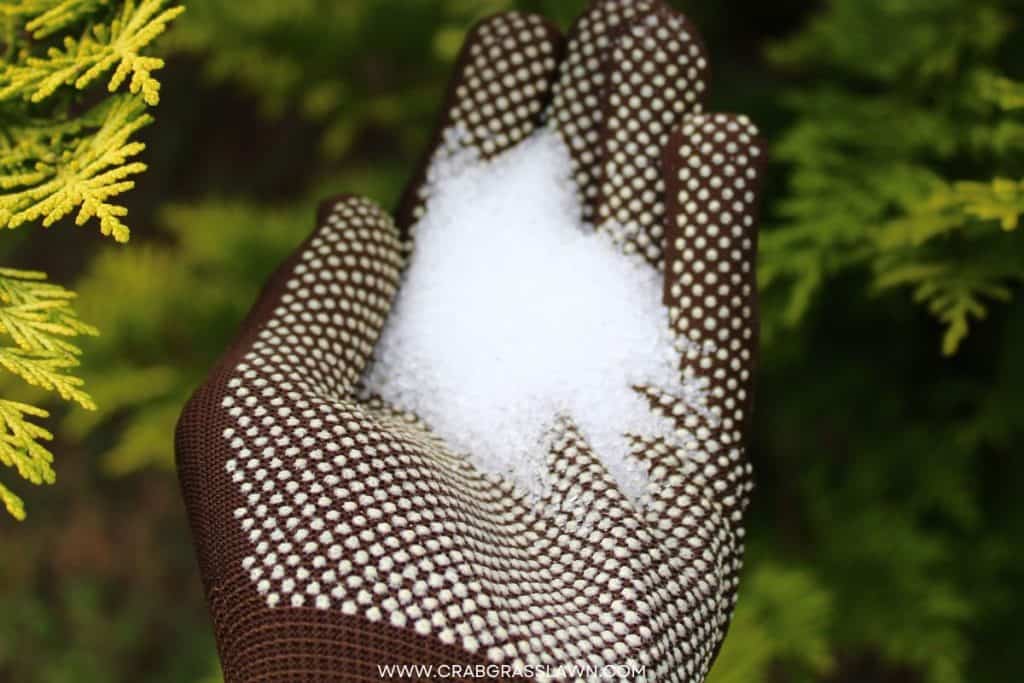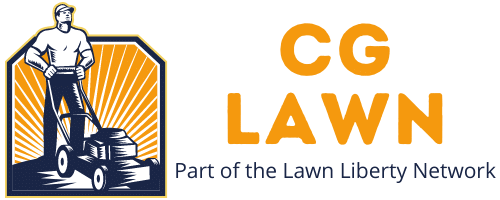Epsom salt is often regarded as an effective weed killer and this is true as long as you use it properly.
Even though Epsom salt may not be a strong weed killer like traditional herbicides, I’ve used Epsom salt in combination with other ingredients and seen great results.
To use Epsom salt to kill weeds, make a solution with Epsom salt, white vinegar, and dish soap and spray the solution on a sunny day.
I’ve created the following guide to help you use the solution properly.
What is Epsom Salt? Is it Different than Table Salt?
Most home gardeners in their quest to find a natural weed killer recipe often use the words table salt and Epsom salt interchangeably, but they aren’t the same.
When you think of salt, the first thing that comes to mind is those white crystals you sprinkle on your food, and salt that’s readily available on your dining table and in restaurants across the globe.
However, table salt is much different than Epsom salt, in that it is made up of the elements sodium (Na) and chlorine (Cl), hence is known as sodium chloride. Epsom salt contrarily is derived from a naturally occurring magnesium sulfate mineral called epsomite.
Furthermore, table salt is edible, but Epsom salt isn’t, and isn’t a true salt because it doesn’t contain any sodium. So even though you can’t use it to add flavor to your food, Epsom salts are used in several cosmetic procedures and for gardening applications as well.

Does Epsom Salt Kill Weeds?
Here’s where things get interesting! The Epsom salt weed killer recipe is touted in leading gardening publications and blogs, but people have been using Epsom salt for decades to feed desirable plants in their gardens and garden centers such as tomatoes, roses, and peppers.
So, does it sound like Epsom salt can kill weeds and unwanted plant life like grass? Epsom salt to me sounds more like a fertilizer as opposed to a weed killer.
But yes, Epsom salt does kill weeds when mixed with water, soap, acetic acid (vinegar), and/or some type of detergent but there’s a catch.
Compared to commercial weed killers, the Epsom salt and vinegar weed killer isn’t a permanent solution to the problem but does provide instant satisfaction as the weeds shrivel and die.
Even though Epsom salt kills the top growth of the leaves of weeds, it fails to destroy the extensive root system of certain weeds like poison ivy, brambles, and dandelion, which grow right back from their roots.
If you want to kill weeds for good, steer clear of exaggerated natural weed killer solutions, but opt for proven natural weed killers or chemical weed killers to tackle perennial weeds, undesired weeds, and pesky weeds.
Now I know you’re going to jump on the bandwagon and say that chemical weed killers are dangerous and bad for the environment, which isn’t the case with the Epsom salt, vinegar concoction. But here’s what these magical ingredients do!
How Does Vinegar Work Towards Weed Control?
Before you go grab that bottle of household vinegar lurking in your kitchen cabinet, wait, because it’s not going to kill any broadleaf weeds.
Household vinegar contains just 5 percent acetic acid, which when sprayed on annoying stubborn weeds will only draw out moisture from the stems and leaves, and quickly turn them brown.
Household vinegar does nothing to kill the roots of weeds growing in your lawn and around garden paths.
Although household vinegar isn’t potent enough to kill most types of weeds, it may be effective against shallow-rooted annual weeds that can’t survive when their foliage is torched.
To kill deep-rooted weeds, you need a stronger horticultural vinegar that has 20 percent acetic acid, but there are at least four problems that I can think of with horticultural vinegar.
- Horticultural vinegar is non-selective, meaning it will damage or kill any plants it comes in contact with including vegetable plants. So, if you decide to use horticultural vinegar on your lawn to eliminate weeds, then you can expect a lot of dead brown grass.
- But that’s not all, horticultural vinegar also affects the growth of plants by killing a lot of good things in your garden soil such as beneficial microbes and earthworms.
- Moving on, highly acidic vinegar can damage your stone tiles and concrete, which you will have to perhaps replace if you decide to spray horticultural vinegar on weeds in your beautiful garden.
- Lastly, but most importantly, you should never use horticultural vinegar in flower beds, lawns, and garden spaces, but instead use it in places where plants will never grow.
How Does Vinegar and Epsom Salt Kill Weed?
Using a pump sprayer or an ordinary garden sprayer to spread vinegar and Epsom salt mix will only kill the part (s) of the weeds that come in contact with the mixture.
What this means is that the vinegar and Epsom salt mixture will not kill the entire plant, and doesn’t kill weed roots.
You can use repetitive sprays of this mixture to kill bad plants like noxious weeds, and even though some of the weeds will wilt and die eventually, you may have to deal with a bigger problem – causing harm to your beneficial plants.
The first thing to remember is that vinegar can kill weeds on its own under the right circumstances, but adding Epsom salt considerably improves its efficacy.
However, Epsom salt is a double-edged sword here, because applying an Epsom salt and vinegar mixture repeatedly can lead to salinity in the soil, which can prevent plant roots from withdrawing water from the surrounding soil.
You can apply an Epsom salt and vinegar mixture repeatedly, but you should ensure you flush the salt through by good, deep watering occasionally.

Can I Use Regular Table Salt Instead of Epsom Salt to Kill Weeds?
Some weed killer recipes say that you can use regular table salt instead of Epsom salt to kill weeds, and even though both will work to kill unwanted grass and weeds, both types of salt buildup are bad, but table salt is essentially sodium chloride, which in excess is toxic to many plants.
Table salt can also cause wilting and dead plants, given that it makes the leaves of plants hypotonic, which hinders their support to transfer nutrients.
What Types of Weeds Does Epsom Salt Kill?
Epsom salt isn’t a cure-all solution for all types of weeds, and there are a couple of weeds that you want to steer clear of completely such as giant hogweed and poison hemlock.
If you have these two weeds growing in your lawn, don’t bother spraying them with a vinegar and salt mixture or even a herbicide because the slightest contact with them can cause you great harm.
Epsom salt can be used to kill most types of weeds, but it’s worth noting that it’s also non-selective, so it will kill grass, moss, and small weeds. Epsom salt is less effective against brambles, ivy, and other woody perennials.
How Long Does it Take for Epsom Salt to Kill Weeds?
The amount of time it takes for Epsom salt to kill weeds depends on the type of weed infestation you’re tackling and the level of infestation.
However, it can typically take up to 10 days for Epsom salt to kill weeds. But again, this is not a permanent solution, as the Epsom salt mixture will not kill weeds at the root level, so there’s a good chance of re-emergence.
Drawbacks of Using Epsom Salt to Kill Weeds – Will Epsom Salt Kill Plants?
One of the biggest drawbacks of using Epsom salt to kill weeds is that this chemical compound is made up of magnesium sulfur and oxygen. Excess quantities of magnesium from Epsom salt can inhibit the uptake of calcium, leading to stunted growth.
Generally speaking, magnesium toxicity is rare, but can definitely occur in your soil with repeated Epsom salt applications.
As I said earlier, Epsom salt doesn’t kill weeds at the root level, so it’s best to avoid using it unless, of course, you’re looking for a temporary weed-killing solution.
The best way to get rid of weeds for good without Epsom salt and chemical herbicides is to pull weeds by hand. However, this can be a daunting task for many gardeners, but you can always pay the neighborhood kid 5 cents or so to pull each weed out along with the top and roots.
Alternatives to Using Epsom Salt to Kill Weeds
If you want to kill weeds in your yard without using Epsom salt, the good news is that you’ve got several options to choose from.
1. Good Ol’ Newspaper
For weeds that have already sprouted and to prevent new ones from growing, a newspaper is a great way to address the issue. Simply, lay down 5 – 10 sheets of newspaper over the weed-affected areas, wet, them to hold them down, and cover them with an inch or two of mulch.
Another great benefit of using newspapers to kill weeds is that as the paper decomposes, it provides abundant food for beneficial soil organisms.
2. Vinegar
Vinegar, especially when mixed with liquid dish soap such as Dawn dishwashing soap effectively kills weeds. Before I get into how to use vinegar to kill weeds in lawns, I need to clarify a few things about vinegar.
I’m often asked, “can I use household vinegar to kill weeds in my lawn”? And what’s the difference between household vinegar and horticultural vinegar when it comes to killing weeds?
- UNMATCHED PURITY AND CONSISTENCY: Experience the difference with our Calyptus 45% vinegar concentrate solution, crafted with the highest purity ingredients. Our concentrated vinegar gallon solution consistently delivers the same smell, color, and results - every time. Shouldn't that be a given?
- NATURE'S POWER - AT YOUR COMMAND: Dilute up to 1:8 with water or use at full strength. One gallon of Calyptus 45% pure concentrated vinegar delivers the equivalent power of nine gallons of standard vinegar. For those who know what they demand!
- SOURCED AND MADE IN THE USA: We take great pride in sourcing and manufacturing our ultra-powerful vinegar concentrate domestically, using high-purity ingredients, that are never imported, so you receive exactly what you think you are ordering, the first time.
Affiliate links and images pulled from the Amazon Product Advertising API on: 2024-04-25
Household vinegar contains just 5 percent acetic acid, therefore needs to be used in combination with other household items to kill weeds in your lawn.
Horticultural vinegar contains four times more acetic acid, roughly 20 percent acetic acid than household vinegar, hence should only be used if the household vinegar mixture fails to kill the targeted weeds.
If you’re wondering how the acetic acid in vinegar kills weeds, here’s the lowdown. The acetic acid in vinegar serves as a desiccant, meaning a drying agent to suck out the water from the weed, eventually drying and killing it.
Vinegar is commonly mixed with dish soap to kill weeds because the dish soap accelerates the vinegar’s effectiveness by breaking down the outer coat of the weeds.
Even though it may be tempting to use horticultural vinegar from the start to kill weeds, it’s recommended that you kick things off with the household vinegar lurking in your kitchen cabinet.
If the household vinegar doesn’t work to kill the weeds, apply horticultural grade vinegar when there is no rain expected in the next three days.
3. RM43 – Best Herbicide for Weeds
RM43 is billed as the best herbicide for weeds for several great reasons, starting with its ability to not only kill weeds but also prevent them for an impressive one year.
But that’s not all, a single bottle of this herbicide can treat a little over 17,000 square feet, and can be used for total weed control or spot weed treatment.
- Kills weeds and prevents weeds for up to 1 year
- Treats 17,297 square feet
- Ideal for fence rows, gravel paths, sidewalks, driveways, parking areas and around farm buildings and barns
Affiliate links and images pulled from the Amazon Product Advertising API on: 2024-04-25
Final Thoughts
Getting back to the main question – does Epsom salt kill weeds? Yes, Epsom salt does kill weeds but only when used with another agent such as vinegar.
However, it’s best that you refrain from using Epsom salt to kill weeds, as too much salt content in the soil can be harmful to plant health.
Instead, try a mixture of vinegar and dish soap, and if that doesn’t work, switch to a potent herbicide like RM43.
Hi, Alex Kuritz here. Growing up I remember that my family had one of the best lawns in the neighborhood. Richly green and lush. I did a lot as I grew up in terms of caring and tending for not only my family’s lawn but also my neighbors. I can say I have years of experience, and I am here to share it with you.




